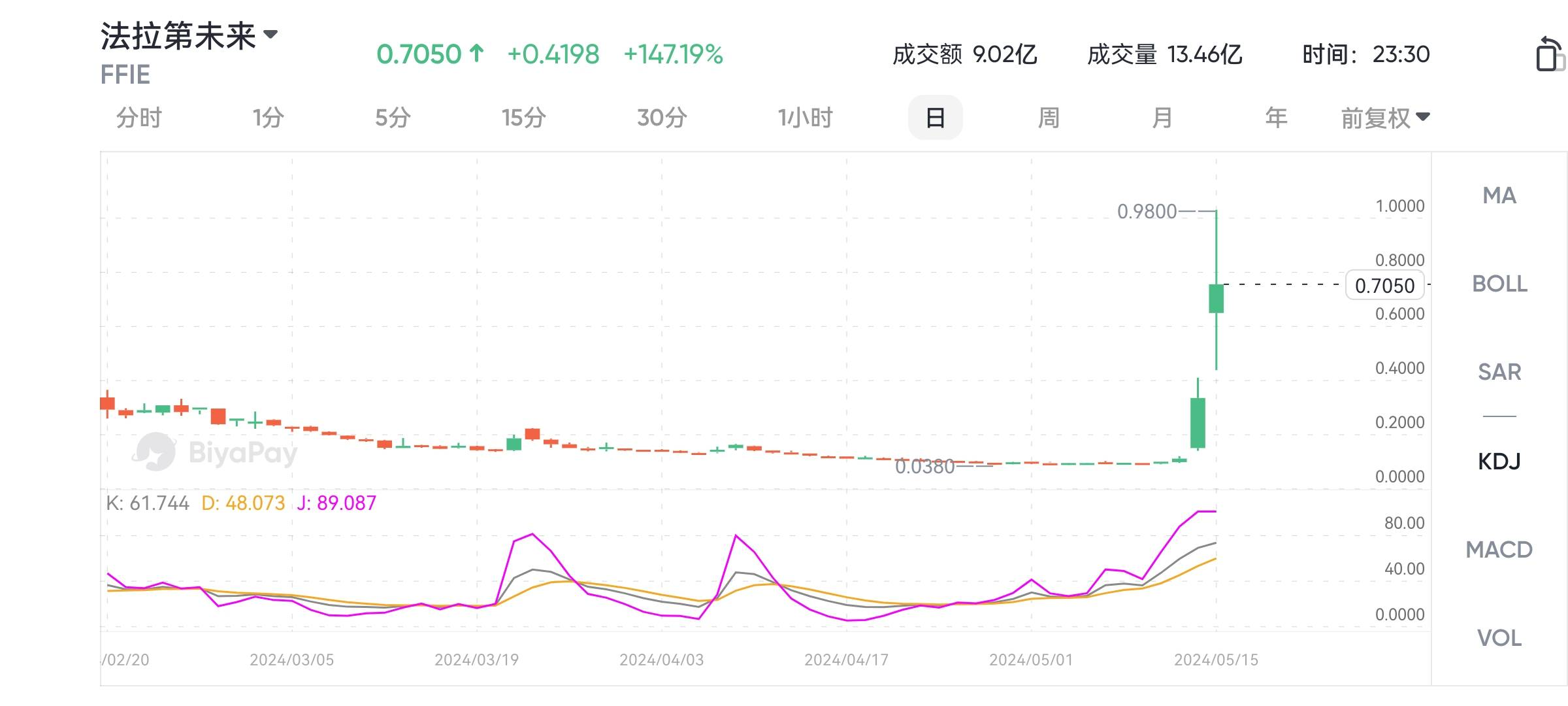- Remittance
- Exchange Rate
- Stock
- Events
- EasyCard
- More
- Download
Faraday Future's stock price surged nearly 20-fold, winning the first battle against delisting, warr
On May 15th local time, Faraday Future’s stock opened high and closed at $0.705 per share, surging over 147% and leading the day’s U.S. stock gainers. Since May 10th, the stock has increased more than 16-fold. Now, FF Automobiles’ market cap has soared to $30.08 million, sparking heated discussions in the market.

FFIE Market Trend, Chart BiyaPay App
Last month, Faraday Future announced that they received a delisting notice from NASDAQ due to the stock’s closing price being below $0.10 for ten consecutive trading days, which does not comply with NASDAQ’s listing rules. However, Faraday Future mentioned that the delisting was not final and they would appeal. Its founder, Jia Yueting, also stated his personal commitment to resolve the delisting crisis.
Now, within just a month, Faraday Future’s stock has seen a dramatic rise and has made a record high increase. The news of the stock’s surge has been widely reported, attracting many investors and shifting the company from a near-death struggle to a period of strong market performance, drawing in a large number of investors.For those interested, investing through a credible brokerage platform is advisable, such as the globally renowned Charles Schwab. Opening an account with Charles Schwab provides a namesake bank account. Investors can deposit digital currency (USDT) into a multi-asset wallet like BiyaPay, then transfer fiat currency to invest in U.S. stocks via Charles Schwab. BiyaPay, licensed in the US, Canada, and New Zealand, also offers U.S. stock investments, where one can search for and invest in Faraday Future’s stock under the ticker FFIE directly.

What are the positive signals behind the surge in Faraday Future’s stock price that investors should pay attention to and consider for investment? Here are a few points to consider.
Unique advantages of local development in the US
On May 14, the U.S. government announced that it would impose a fourfold increase in tariffs on imported electric vehicles and other products from China, raising the tariff rate from 25% to 100%. This means that the cost for Chinese electric vehicles to enter the U.S. market will significantly increase, greatly limiting their expansion. However, Faraday Future is the only electric vehicle concept stock with a Chinese background that is developing locally in the United States, and it might be the only one not affected by this ban. Therefore, it could potentially have significant merger and acquisition value imagination space, attracting speculative capital and driving up its stock price. This advantage could continue in the future, presenting a unique development opportunity for Faraday Future, further enhancing its competitiveness and sending a positive signal to investors.
Jia Yueting IP monetization
Recently on social media, Jia Yueting, the founder of Faraday Future, announced that he will begin to commercialize his personal IP. He stated, “On the basis of light operations, we will explore a new path for IP e-commerce in the era of IP e-commerce 2.0 through model innovation, AI technology innovation, globalization of IP e-commerce, and the international expansion of Chinese brands and products. The funds earned from the commercialization of personal IP will be partly used to pay off debts and partly to subsidize car manufacturing to support the basic operations of FF.”
In the days following this announcement, the company’s stock experienced a surge. On May 15, Jia Yueting responded on social media, “Since I announced the plan for IP commercialization, I have felt everyone’s fiery enthusiasm. I have already received hundreds of thousands of related private messages and comments. Many friends have made suggestions and sent collaboration requests through comments or fan groups, involving various industries.”
Leveraging the policy advantages mentioned above, Faraday Future can assist Chinese automakers and supply chains in rapidly entering the U.S. market, significantly reducing trial-and-error and time costs. This will also provide more opportunities for the company to collaborate with Chinese automakers. The commercialization of Jia Yueting’s personal IP also supports these collaborations. As he responded, there is already a significant demand for partnerships, which are being negotiated. If these collaborations materialize in the future, they could bring significant development opportunities to the company. This will be beneficial not only in resolving the company’s current crisis but also in boosting investor confidence in the market.
Retail investor sentiment is high
Retail investors, often overlooked in the stock market, can wield impressive power when united. Their collective interest and emotional investment in a particular stock can turn it into a “meme stock.” Meme stocks are those that become popular among retail investors on social media and online forums, leading to significant price volatility. This phenomenon is usually related to the collective interest and emotional investment in specific stocks rather than analysis based on company fundamentals.
Data shows that Faraday Future has a high short-interest ratio of 95%, indicating that the short sales volume represents 95% of the stock’s trading volume. Influential retail figures like Keith Gill have rallied retail investors to challenge Wall Street shorts, boosting investment sentiment towards Faraday Future and turning it into a new meme stock with a substantial price increase. However, the pressure from short-covering might further drive up the stock price, significantly impacting Faraday Future and the market’s assessment of the stock. Nevertheless, the investment behavior of retail investors is susceptible to influence and requires careful evaluation.
Summary
Based on the previous analysis, it can be seen that Faraday Future has developmental advantages in terms of policies and Jia Yueting’s personal IP commercialization, which have brought confidence to the company internally and in the investment market. Capitalizing on these advantages is crucial for the company to resolve the delisting crisis and achieve long-term development. The current high investment sentiment among retail investors has also impacted the stock, leading to further price increases and attracting investor attention.
However, risks exist as well. The delisting risk of Faraday Future highlights the challenges faced by the electric vehicle industry during its development process. Although Jia Yueting’s responses and measures demonstrate his commitment and responsibility towards the company, the future of Faraday Future remains filled with uncertainties.

























